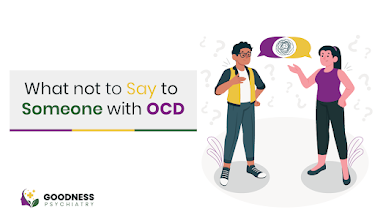What Not to Say to Someone with OCD
Obsessive-Compulsive Disorder (OCD) is a mental health condition that affects millions of people worldwide. It is characterized by unwanted, intrusive thoughts (obsessions) and repetitive behaviors (compulsions) that an individual feels compelled to perform. Understanding OCD and the way it impacts someone's life is crucial in offering support, but it’s just as important to recognize what not to say to someone with OCD. Words can be powerful, and when not used thoughtfully, they can unintentionally make the person feel misunderstood or isolated.
1. "Just stop thinking about it."
One of the most common misconceptions about OCD is that it's
just about "thinking too much." The truth is, people with OCD often
can’t control their obsessive thoughts. Telling someone to "just
stop" can be frustrating and dismissive because it oversimplifies their
experience. Instead, offer empathy and understanding, and avoid statements that
imply the person can control their thoughts at will.
For those struggling with OCD, seeking a psychiatric assessment near
me can help provide a deeper understanding of the condition and guide
them toward effective treatment options.
2. "Everyone has some OCD."
While it's true that many people might exhibit occasional
obsessive or compulsive behavior, OCD is a serious and debilitating disorder.
Minimizing someone's experience by saying, "Everyone is a little
OCD," can be hurtful and invalidating. It trivializes their struggles and
suggests that their disorder is not worthy of attention or treatment. A better
approach is to acknowledge their feelings and offer support, whether through a
psychiatric assessment or therapy.
If you are in need of a depression therapist in
Arlington, TX, or a professional who specializes in OCD, it's important to
seek the guidance of a qualified mental health expert. They can help
individuals navigate their challenges and create a personalized treatment plan.
3. "You're just being dramatic."
When someone is in the midst of an OCD episode, they may
feel overwhelmed by the need to perform a specific ritual or act in a
particular way. Dismissing these behaviors as "dramatic" can make the
individual feel ashamed of their condition. It's important to be patient and
understanding, recognizing that their compulsions are not based on drama but on
a real mental health condition.
Instead of labeling someone as dramatic, it's crucial to
understand the seriousness of OCD and how it impacts their everyday life.
Encourage them to reach out for professional help, such as depression treatment
in Arlington, where they can explore therapy or medication options
tailored to their needs.
4. "It’s not a big deal. Others have it worse."
Comparing one person’s experience with OCD to another's, or
to other mental health struggles, is unhelpful and harmful. While others may be
dealing with their own challenges, it doesn't diminish the person’s experience
with OCD. Acknowledging that someone’s symptoms are real and valid is far more
supportive than trying to minimize their experience.
If you or someone you know is struggling with OCD and
depression, there are effective treatment options available. Consider cheap
ketamine treatment, which has shown promise in addressing severe depression
and can be part of a broader treatment strategy.
5. "Why can’t you just get over it?"
People with OCD often feel trapped by their obsessions and
compulsions. Telling them to "just get over it" is not only unhelpful
but also reflects a lack of understanding of how mental health conditions work.
Overcoming OCD isn’t a matter of willpower, but often requires professional
help, such as a depression therapist in Arlington, TX, or other
treatment options.
Rather than pushing someone to get over their condition,
encourage them to explore psychiatric care. A psychiatric assessment near me
can help determine the most effective course of treatment, whether through
therapy, medication, or alternative options like ketamine therapy.
How You Can Support Someone with OCD
Instead of offering unhelpful phrases, consider being an
active listener. Show empathy and support by:
- Encouraging
them to seek treatment, whether through cognitive-behavioral therapy or
medication.
- Gently
guiding them toward professional help, such as psychiatric assessments or
therapy with a qualified professional.
- Reassuring
them that it’s okay to ask for help and that mental health treatment can
lead to significant improvements.
Seeking Professional Help
If you or someone you know is struggling with OCD, reaching
out for professional assistance is a crucial first step. Whether it's finding a
depression therapist in Arlington, TX, exploring depression treatment
in Arlington, or looking into cheap ketamine treatment
options, taking action towards managing OCD can lead to a more fulfilling life.
Don’t hesitate to consult with experts who specialize in mental health to
develop a personalized treatment plan.
At Goodness Psychiatry LLC, we offer a comprehensive
approach to managing OCD and other mental health conditions. Our team is here
to guide you through psychiatric assessments, therapeutic interventions, and
more, so you can get the support you need for lasting improvement.

.jpg)
Comments
Post a Comment